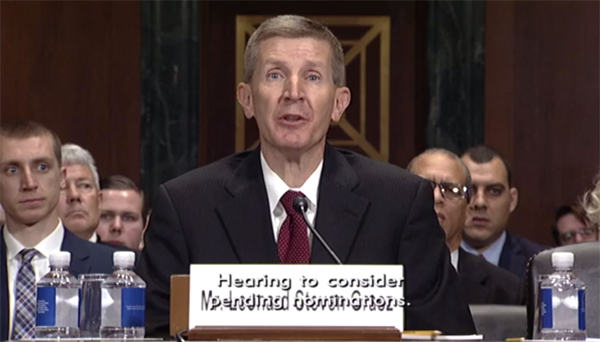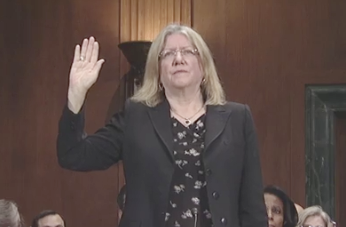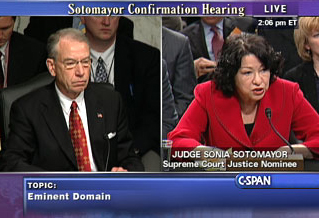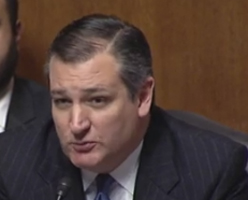ABA committee member provides context to 'you guys' comment in Grasz interview

A screenshot of Leonard Steven Grasz testifying on Nov. 1.
Clarified: A member of the ABA Standing Committee on the Federal Judiciary who interviewed Leonard Steven Grasz is providing context to a comment about "you guys" in a discussion they had during the interview process.
The ABA committee gave Grasz a “not qualified” rating because of concerns about a lack of open-mindedness and freedom from bias—the only time that justification was cited in the ABA’s ratings of more than 50 nominees this year, according to a supplemental statement (PDF) released by the organization on Wednesday.
In the statement, one of two lawyers who led reviews of Grasz, Laurence Pulgram, commented on Grasz’s Nov. 1 testimony to the Senate Judiciary Committee about an interview with Pulgram.
Pulgram asserted that Grasz “said a number of things that cast the interview in a one-sided way, and which the press has since embellished or misstated.” One issue, Pulgram said, was Grasz’s initial assertion that Pulgram referred to “you people” during the interview. Pulgram says he used the words “you guys”; Grasz now agrees that phrase was used in a document (PDF) he filed with the Senate on Monday.
Grasz, a Husch Blackwell lawyer from Omaha, Nebraska, is nominated for the St. Louis-based 8th U.S. Circuit Court of Appeals.
During Wednesday’s hearing, several Republican senators contended the ABA was a liberal advocacy organization and its ratings may be swayed by political bias. Two Republican senators referred to political donations made by the ABA committee members to Democratic candidates and organizations before they joined the committee.
Sen. Ted Cruz of Texas said the ABA has the right to take liberal positions. “But I don’t believe an advocate with a stake in a particular outcome should be given a privileged role and be treated somehow as a neutral arbiter,” he said.
SUPPLEMENTAL STATEMENT
The ABA released the supplemental statement before testimony by Pamela Bresnahan, the chair of the ABA Standing Committee on the Federal Judiciary.

Pamela Bresnahan testifying before the U.S. Senate Judiciary Committee on Nov. 15.
In that statement, Bresnahan defended the ratings process as thorough and based on professional qualifications. She said the ABA has released 50 ratings so far this year (the number increased to 53 late Tuesday), and only four nominees were rated “not qualified.”
In a prior statement, Bresnahan said Grasz had a “passionately held social agenda” that appeared to affect his commitment to precedent, including Roe v. Wade. Bresnahan pointed to a 1999 law review article written by Grasz titled “If Standing Bear Could Talk … Why There Is No Constitutional Right to Kill a Partially Born Human Being.”
The lawyer who led the initial evaluation of Grasz for the ABA committee was Cynthia Nance, a professor at the University of Arkansas Law School and its former dean. Pulgram, a practicing lawyer in San Francisco who mainly represents corporate defendants, conducted a second evaluation because Nance’s evaluation produced a “not qualified” recommendation.
Pulgram interviewed Grasz on Oct. 9. Pulgram commented on that interview in the ABA’s supplemental statement.
First, Pulgram said, Grasz told the Senate Judiciary Committee that Pulgram had asked what school Grasz’s children attended, a question that “kind of surprised him.” Pulgram said it was part of a follow-up question about Grasz’s school board work for Concordia Lutheran School.
“Second,” Pulgram said, “Mr. Grasz said in his testimony that I repeatedly made references to ‘you people’ in a negative way, and that when he asked what ‘you people’ meant, I said ‘conservatives and Republicans.’ This exchange is incorrect.”
Pulgram says that Grasz “implicitly recanted his testimony that I ever used the words ‘you people’ ” in a Nov. 13 response to post-hearing questions. Grasz’s response says Pulgram repeatedly referred to “you guys” in a negative tone.
Pulgram said Grasz was apparently referring to a discussion about an article the nominee had written for the Federalist Society in which Grasz criticized Nebraska’s nonpartisan merit selection system for judges. Four Democrats and four Republicans are on the merit-selection nomination commission, but Grasz asserted that trial lawyers had more influence.
Pulgram asked why, and Grasz replied “because they care more,” according to Pulgram. “I then asked why that would be unfair, as ‘you guys are entitled to care just as much.’ Mr. Grasz sat up and asked me, ‘What do you mean ‘you guys?’ … He seemed to think that I was somehow siding with the plaintiffs lawyers.”
Pulgram said he intended “you guys” to mean anyone who was against the plaintiffs lawyers’ agenda. Pulgram also said he wasn’t asking the question due to any allegiance on his part. “My question was simply seeking to understand why he perceived a process to be unfair because one group, any group, cared more and was more active than another.”
Pulgram also said he did not interview a partner from Grasz’s law firm who asserted in a Nebraska newspaper interview that “the evaluators who interviewed him were clearly liberals who were out for blood.”
After the interview with Pulgram, Grasz gave the committee a new 14-page document, Pulgram said. The document reflected the nominee’s efforts to intervene, in his own name, using information that was confidential to change an outcome of the Nebraska judicial nominating process, according to Pulgram. Grasz was seeking to give the state’s governor an opportunity to appoint a preferred candidate, Pulgram said.
“And, for the record,” Pulgram said, “I never described Mr. Grasz’s acts as any kind of ‘plot.’”
In the supplemental statement, Pulgram and Nance explained their concerns about Grasz being unable to separate his strongly held beliefs from his ability to rule as a judge free from bias.
From the outset, Nance said, it was clear that Grasz is an “an accomplished attorney” whose legal work was praised for its quality and caliber. Many also spoke very highly of Grasz’s integrity, she said.
However, Nance said, she received several comments raising concerns about Grasz’s “open-mindedness, freedom from bias and commitment to equal justice under the law. These interviewees raised serious doubts that Mr. Grasz would be able to set aside his role as an advocate and his strongly held beliefs, in order to rule impartially as is required of a judge.”
Nance said a majority of those providing feedback described Grasz as “gracious, even-tempered and easy to work with.” But she also received “numerous comments” that Grasz “had been inappropriately aggressive and that his conduct towards opposing counsel could be difficult, bordering on incivility.” Those concerns contributed to her rating, Nance said.
Nance said she discussed Grasz’s law review article on “partial-birth abortion” during her interview with him. Grasz said that “partially born” is not the same as “born” and neither Roe v. Wade nor Planned Parenthood v. Casey should control.
Nance said she contacted more than 1,800 lawyers and received 183 responses, 69 of which were substantive interviews, faxes or e-mails. Nance said she noticed a reluctance among some members of the Nebraska bar to participate in the ratings process because of fears of retribution if their comments were made public.
Pulgram said he reviewed Nance’s “voluminous report,” reviewed additional writings of Grasz, conducted follow-up interviews, and interviewed 24 additional lawyers and judges. He also noted a reluctance to speak among “an unusually high number of people” who noted Grasz was closely connected with and sponsored by the most powerful politicians in the state.
Pulgram said many of Grasz’s peers who spoke with the committee believed he would be sufficiently open-minded to be free from bias, while “a significant number raised concerns that Mr. Grasz’s strongly held social views and/or his deeply rooted political allegiances would make it impossible for him to have an unbiased and open mind on critical issues. There were also some who said that they were impressed by Mr. Grasz’ professional competence and acumen; they just did not know about his open mindedness and freedom from bias.”
Pulgram said he reviewed Grasz’s writings, “which evidenced a high level of emotional commitment to his strongly held views.”
In one opinion written when working for the attorney general, Grasz wrote that the “legal question presented [by proposed abortion legislation] is so utterly divorced from moral or rational foundation that it undermines the credibility of the legal system, and necessarily exposes the moral bankruptcy which is the legacy of Roe v. Wade.” The statement, Pulgram said, raises questions about Grasz’s ability to assess issues neutrally and free from bias.
SENATORS WEIGH IN
Cruz was among four Republican senators who said the ABA’s rating could be influenced by political bias. The others were John Cornyn of Texas, Ben Sasse of Nebraska and Chuck Grassley of Iowa, the chairman of the Senate Judiciary Committee.

Screenshot of Sen. Chuck Grassley, R-Iowa.
Grassley referred to an analysis of donations made by members of the Standing Committee on the Federal Judiciary before they began work on the committee. The committee’s 15 members had made at least 74 donations to federal political organizations and candidates, and 68 of those donations were made to Democratic candidates or political groups, according to Grassley.
Cruz said five committee members had formerly donated to Republicans, but the amount was low and the donations were typically to local candidates. Four of the five had given more to Democrats than to Republicans, he said.
Two committee members formerly donated to the group Emily’s List, which supports abortion-rights political candidates, and one of them was Bresnahan, Cruz said.
Cruz also turned to social media to support his argument. He said that Nance had retweeted a tweet in 2012 that said GOP candidates were constitutional strict constructionists who want women to have all the rights they had in 1787. He also said Nance joined a letter in 2005 opposing the confirmation of Justice Samuel A. Alito Jr. because his jurisprudence was deemed insufficiently pro-abortion.
Cruz said Pulgram was a member of the Lawyers’ Committee for Civil Rights in San Francisco who had donated to Barack Obama, Hillary Clinton, and current Democratic senators Elizabeth Warren of Massachusetts and Kamala Harris of California.

Screenshot of Sen. Ted Cruz, R-Texas.
Bresnahan countered that the evaluations by the committee are not political and are not politically biased. Rather the committee reached its conclusion after hearing from Grasz’s peers, who raised concerns that Grasz would try to find a way around the law rather than follow established precedent, Bresnahan said. Other nominees with conservative views did not yield similar concerns, she said.
In a statement released after the hearing, ABA President Hilarie Bass said: “The ABA is a nonpartisan organization and appoints members to the Standing Committee on the Federal Judiciary in a nonpartisan way. Committee members are named with a goal of diversity of background and area of law.
“The American Bar Association has been impartially evaluating federal judicial nominees since 1953. During those 64 years—through both Republican and Democratic administrations—the ABA’s Standing Committee on the Federal Judiciary has thoroughly vetted thousands of nominees using a fair and nonpartisan process that no other organization can match.
“Because federal judicial posts are lifetime appointments, ensuring that lawmakers have as much information as possible about candidates before approving them is critical. The federal judiciary is a fundamental part of our government and appointing the most qualified people to it is integral to our democracy.”
Updated at 2:50 p.m. to include information about the hearing on Wednesday and the statement by Hilarie Bass. Clarified on Nov. 16 to report that Grasz later said Pulgram had used the words “you guys.”
Write a letter to the editor, share a story tip or update, or report an error.


